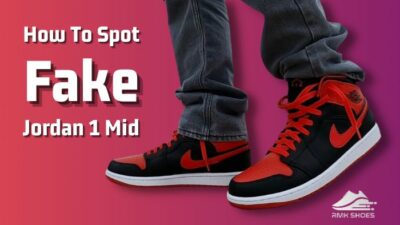We all love a hike through different terrains and different times of the year. Most of the time, we’re unaware of the danger that is lurking around us.
That’s right! I’m talking about snakes in particular.
Rubber boots are our go-to footwear while going on different landscapes. But, have you thought about the amount of safety they provide?
If not, then don’t worry! I’ve compiled this comprehensive list that’ll answer all your questions. And make your outing a lot safer.
Let’s get to the point first; can a snake bite through rubber boots?
Not the answer you were looking for? Don’t worry! It’s not the end of the world. There’s obviously a solution. Keep reading to it all.

Can Snake Bite Through Rubber Boots?-Answered
When a snake sinks its fangs, it doesn’t care whether it has bitten any boots or skin. It’ll instantly pull away.
Therefore, rubber boots will indeed protect you. But the boots need to be thick enough.
Snakes of the most venomous kind can easily pierce through your boot. Let’s say, you’re wearing a pair of gardening or rain boots out on a snake-prone terrain. Then only a miracle can save you.
Common rubber boots are usually made up of PVC rubber, with a thickness up to 3 mm. For extra protection, the toe region is made to be 4mm. The midsole may also include a rigid plastic construction.
If you’re out in such boots, then the type of snake you encounter will determine your safety.
On the other hand, more fashionable gardening boots have an overall thickness of 2mm-3mm for the entire body, which in no way is safe against snake bites.
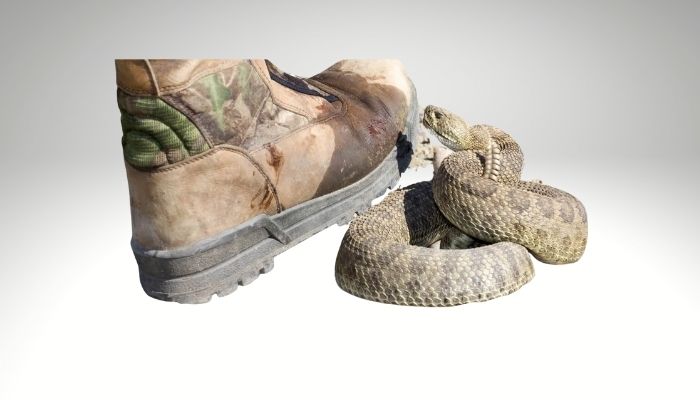
If you take the above boots into contention, then work boots and all-purpose black and green rubber work boots are a safer option.
If truth is told, then rubber boots are a gamble against snake bites. Because you won’t know what kind of snake you’re going to encounter.
Then which boots work against snake bites? Scroll down to find out in the next segment.
Check out our separate post: Can Snakes Bite Through Cowboy Boots.
Why Do People Wear Rubber Boots?
When the word rubber boots come to our mind, we picture ourselves wearing them on rainy days or snowy days (certain times). But, are they meant for the rain only?
Let’s find out!
Workers plying their trades in farms, mines, and various industries use rubber boots because it helps them to protect their feet from any kind of danger.
Rubber boots also prevent any kind of liquids from seeping into the boots, be it hazardous or harmless.
This particular footwear is widely used in the agriculture sector as workers are required to work in mud and dirt throughout the day. They aren’t affected or damaged by moisture; so yeah!
Hikers also use rubber boots because they’re protected from almost any kind of mishap. Especially, if you take into account the fact that nothing can penetrate through them.
Rubber boots are made knee-high to provide maximum protection.
However, manufacturers are kneeling towards ankle-length rubber boots; thanks to fashion trends changing at a fast pace. People want functionality combined with fashion, these days.
Rubber Boots vs Snake Proof Boots: Differences to Know
According to The Department of Wildlife Ecology and Conservation, around 8000 Americans are stung by snakes annually. While the numbers aren’t overwhelming, I’m sure you wouldn’t want to be the next victim.
While rubber boots do work in certain cases, you’ll need specialized boots to ensure complete protection. Snake-proof boots to be precise.
So what differs rubber boots from regular rubber boots? It’s mainly the material used and the construction. I’ve made this table, which will showcase the differences and help you make better purchase decisions.
| Rubber Boots | Snake-proof Boots |
|---|---|
| Consists mainly of rubber | Consists of specially designed puncture-proof materials. Eg; neoprene, polyurethane, rubber, and leather |
| Covers around 4-6 inches of your legs | Covers around 14-inches to 18-inches of your legs |
| Does not have such an extra layer of protection in their toe region | Has an extra layer of protection inside the toe as most venomous snakes would bite in the lower feet region |
| Usually have tight-fitting. So no extra gap | Some have loose-fitting, so the dead-air concept works efficiently |
Check out our separate post on how to Stop Rubber Rain Boots From Squeaking.
Can Snake Bite Through Leather Boots?
Yes, snakes can bite through leather boots. But, not all of them have the jaw power to do so. A sturdy pair of tall leather boots geared up by a safety toe on rough terrains is an excellent option for protecting your feet. It’s insurance against any danger.
When you go on hunting trips, it’s always a good idea to go fully prepared. Because you’ve no idea what you might come up against. No one does!
There’s danger always lurking; especially if you have a knack for hunting in the marsh and damp tropic lands. Snakes are the regular culprits. But, can you blame them?
Many of us feel a sense of security while hunting in leather boots, but it’s a calculated gamble and you should pray so the balance swings in your favor. Otherwise, you’re doomed.
Some snakes can easily bite through the leather to your skin; giving you a run for your life. While the lucky ones have returned from the face of death, it isn’t the case with others.
If you’re hunting on rough terrains, your feet should be covered with tall leather boots, equipped with safety toes. Ensuring total ankle and foot protection.
Composite toe is lighter than steel toe; can be easily paired with snake gaiters. This combo works great in the summer and spring months when snakes are more active.
Also read, Leather Vs. Rubber Sole.
What Materials Can Stop A Snake Bite?
When it comes to protection against snakes, the material of the gear you’re wearing obviously does matter. The wrong material can lead to unwanted outcomes.
Many ask; what material can withstand a snakebite? Rocks! I mean they’re super hard; impenetrable to be precise! So what better, right?
Just kidding! While it’s a fact, you can’t wear stuff made up of rocks. Can you?
But luckily for you, there’re protective gears made up of different materials to suit your needs. For your convenience, I’ve listed the most prominent ones out there.
Here are the best materials that can stop a snake bite:
Super Fabric
That’s right, super fabric! It’s a type of material used for making anti-snake gears. Namely; snake sox. The protected portion of the socks is made of this material. It’s super durable and breathable.
The bottom section of the gear is made up of a high-performance polyester blend. The two combine together to form a formidable shield against those slippery serpents.
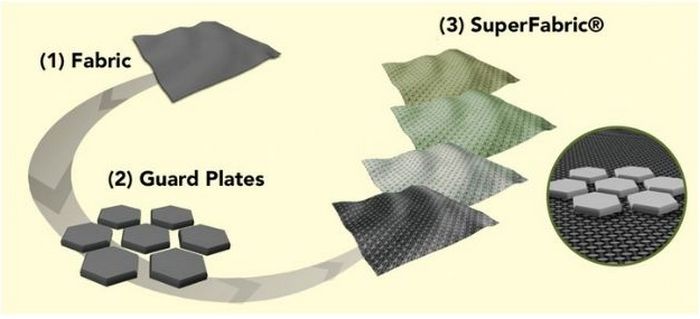
Heavy-Duty Mesh-Covered Canvas
The name’s quite sophisticated, right? Well, the work it does is sophisticated as well. This lightweight and waterproof material is used to make some of the best snake gaiters out there.
Check out our separate post on Ugg Boots Sizing Guide.
1000 Denier Nylon
This particular material is sturdy and highly durable. It’s super light too. It’s used to make a whole bunch of different products, including Crackshot Corporation Snake Chaps. It’s Flexible and super comfy too.
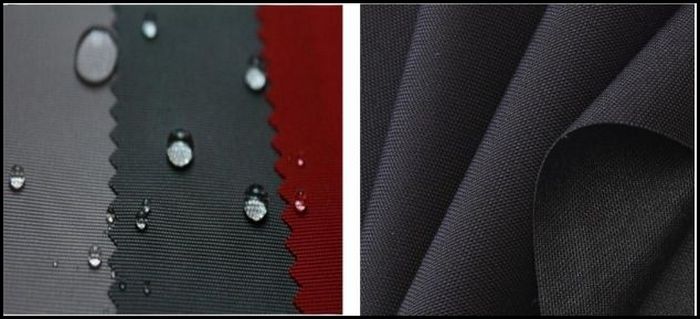
High-Strength Ballistic Fiber
The name says it all, doesn’t it? A blend of high-strength ballistic fibers and polyester combines very well to make the ultimate snake gaiters. They’re lightweight, windproof, flexible, and most importantly waterproof.
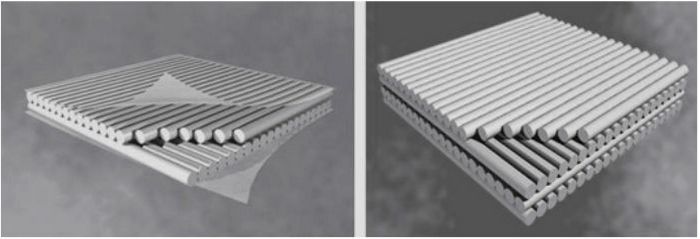
Wear Protective Gears
Snakes don’t necessarily bite you at a specific place as they don’t have one of their choices. They’ll just lash straight out and bite any place that reaches their mouth.
What does it mean? It means that your calves, ankles, feet, shins, and hands are most at risk.
Boots are designed to cover up to a certain portion of your legs. So how do you ensure complete protection? One of the first things you should do is, avoid tight-fitting clothes while on your adventures.
Tight clothes mean snakes bite very close to the skin. And you don’t want that, trust me!
While you’re on your adventures, we recommend you use certain safety equipment. Wear loose pants, and gadgets such as gaiters and waders are highly recommended.
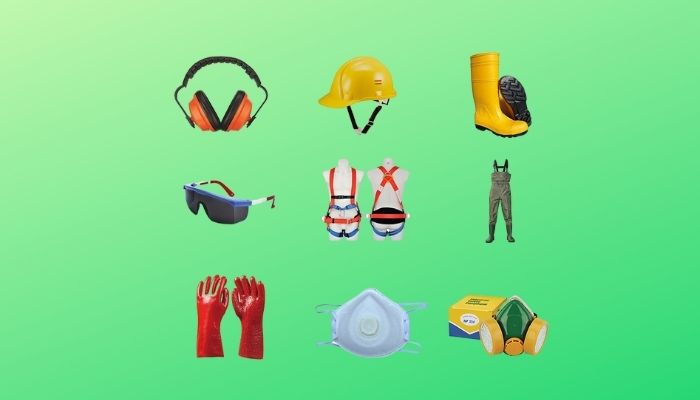
Waders keep a bit of dead air between a potential bite and your legs. It’s called the dead air concept.
When a snake strikes a human, it’s usually a warning; which lacks precision. As a result, the snake makes contact with the cloth or the footwear; not the skin. Therefore, the serpent fails to sink its fangs deeper.
Failing to touch the skin at most times. It’s a strategy widely used by hunters and researchers. The air between the cloth and skin does the trick.
Follow our other guide to know L.L.Bean Boots Sizing Guide.
Do Snake Proof Boots Really Work?
Snake Proof boots do work. But, the effectiveness is not 100%. That being said, it’s still a great form of prevention from snake bites. They still have other noteworthy features that make them a great investment. So it’s more good than bad.
Almost every product in the market has good variants and bad variants. And, it’s no different when it comes to snake-proof boots. They vary in the quality of materials used and the quality of construction.
Manufacturers lay puncture-resistant plates to protect your toes, ankle, feet, and calves from snake bites.
While some place the (puncture-resistant) within the layers of the boot’s construction, others place it on the outside of the boot. But, the thinking process is the same. Protection!
While some manufacturers provide shady details about how they test their boots, reputed manufacturers such as Thorogood provide accurate details.
Thorogood uses real and live rattlesnakes to test their boots. Hence, they have very good reliability of the market.
Parting Thoughts
Do rubber boots work against snake bites?
It does. But, it depends on various factors. One thing’s for sure, regular rubber boots won’t work at all. You’ll need thick ones and the snake needs to be less venomous.
If you’re an adventure junkie, you’ll have proper gears which include snake-proof boots.
Remember, snakes are more afraid of humans than humans are of snakes. They only lash out at people out of fear.
So, when you’re going for a hunt or anything else in snake-prone areas, it’s for your betterment that you carry all the necessary gears.

